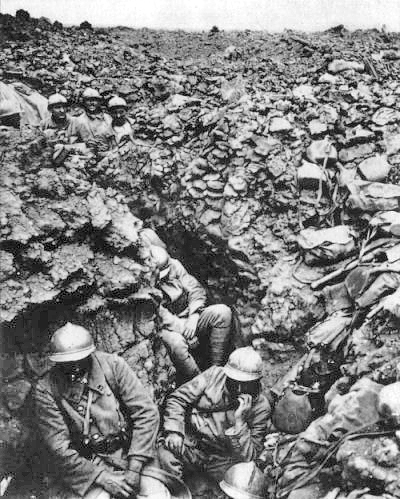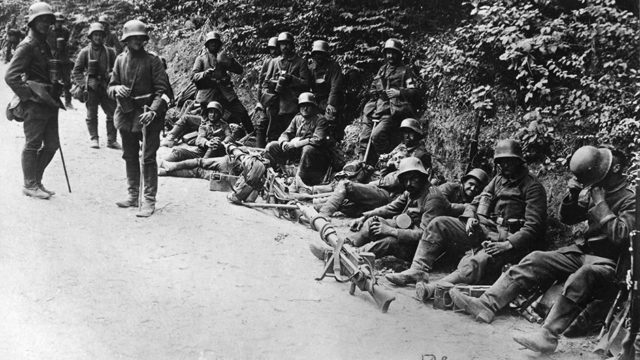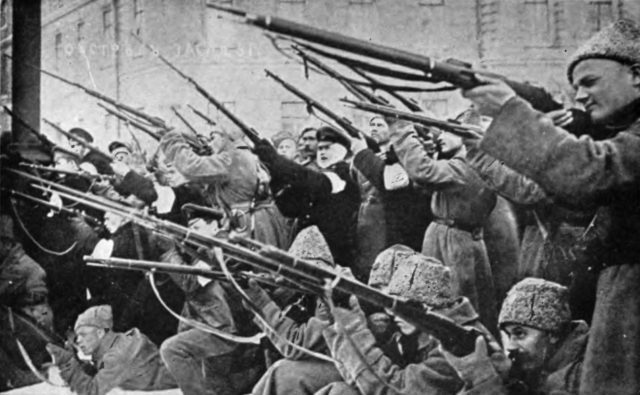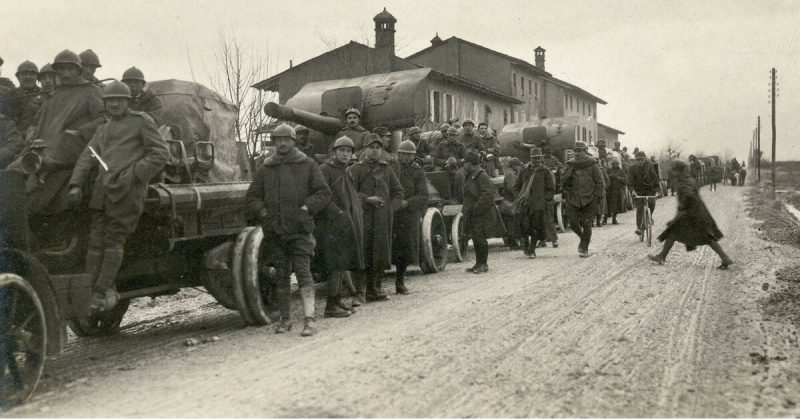WWI was a grueling and dehumanizing conflict. Soldiers saw friends slaughtered in fruitless attacks for the sake of strategies they could not understand. The constant pressure of trench warfare crushed their spirits.
Unsurprisingly, there were several substantial and strategically significant breakdowns in military morale.
French Mutinies of 1917
At the end of 1916, Robert Nivelle became Commander-in-Chief of the French Army. His spirits bolstered by the retaking of lost ground, he planned a grand attack against German fortifications, in coordination with his allies.
The resulting attack in the spring of 1917 was not the glorious triumph he had sought. The Fourth, Fifth, Sixth, and Tenth Armies were thrown into a disastrous assault at the Chemin des Dames. They inflicted heavy casualties on the Germans but suffered massive injuries themselves. 187,000 French soldiers were killed, wounded, or captured. The major breakthrough Nivelle had predicted never occurred.
Instead of breaking the German lines, he broke his own men’s morale. After years of struggle, the costly failure was the last straw. On April 29, a unit at Châlons-sur-Marne refused to take orders. Others followed its lead. Across the front, thousands of soldiers refused to follow commands.

It was an embarrassment for the French, but not the disaster it could have been. Although the troops refused to take part in attacks, they were still defending their country and continued to fight when attacked.
As the mutiny grew, soldiers began to desert. The government responded. General Pétain replaced Nivelle. Over the following months, Pétain used a mixture of the carrot and stick to end the mutiny. Selected men were punished. The rest were given longer breaks from the front. Pétain promised no more large offensives until tanks and the Americans arrived to back up the French infantry. The Germans knew nothing about the opportunity they had missed.
The Germans knew nothing about the opportunity they had missed.
The Battle of Caporetto
The Italian Front, although often neglected by historians, was as brutal and grueling as any other part of the war. It was also the site of a morale collapse that, in different circumstances, could have changed the course of the war.
In May 1915, the Italian army began its attempts to invade Austro-Hungarian territory. The army was poorly equipped, trained, and led. The campaign consisted of repeated attacks up the Austrian-held Alps, some of the steepest mountains in Europe.
Led by the unimaginative but determined General Cadorna, the Italians made a dozen attacks on the Izonso front. Austro-Hungarian troops fired down on them from defensible mountainside vantage points. They unleashed man-made landslides onto the advancing Italians.

After two years, the Italian troops were utterly demoralized. They had suffered heavy losses amid miserable weather, and they barely understood what they were fighting for. Cadorna had repeatedly failed to provide the supplies they needed.
In 1917, the Italians finally managed to penetrate into Austria. The Austrians, supplied with extra troops by their German allies, launched a counter-attack in late October.
It was the last straw. The Italian army promptly collapsed. Around 700,000 men were lost in the battle; most of them not injured or killed but surrendering or deserting. 70% of Cadorna’s army was gone.
The collapse would have led to Italy’s total defeat, if not for the fact that the Austro-Hungarians had not anticipated such a success. They left Cadorna just enough time to regroup and hold out until reinforcements arrived.
The Russian Revolution
Revolutionary politics in Russia was fuelled by poor morale in the army. It became a vicious cycle, in which political turmoil destroyed the last of the Russian military’s will to fight.
By 1917, morale was already low in the Russian army. Since the start of the war, they had been fighting half the armed forces of the Central Powers. It had been a grueling battle that featured superguns, supply shortages, and all the horrors of war.
In early 1917, two events took place that pushed poor morale past the point of recovery. In January, the Entente leaders of Britain, France, Italy, and Russia decided 1917 would be the year they made a big push to win the war, with advances on every front. Then, in March the monarchy was overthrown.
Troops on the front found themselves in a state of uncertainty. Without the Tsar under whose banner they had fought, who were they fighting for? Shifting political structures left them confused about their place in the world. Desertions rose.

Then, on June 30, Russia launched its part in the promised great offensives. Faced with new German tactics of defense in depth, the advance ground to a blood-soaked halt. A new commander-in-chief decided that, instead of fighting the Germans, he would turn around and launch a coup.
Rather than push their advantage in combat, the Germans encouraged the Russians to destroy themselves. They sent the Communist leader Lenin home, hoping he would stir up trouble. As autumn turned to winter, the army joined in a revolt against the government rather than go on fighting for leaders they did not trust.
Russia withdrew from the Great War and descended into civil war.
The British Face the Spring Offensives
Even the British, famed for their stiff upper lip, suffered a period of shattered morale.
In March 1918, the Germans launched the Spring Offensives. Using storm troopers and shock assaults, they smashed Allied lines and sent the British into full retreat. Morale sank so low that Field-Marshal Haig subordinated his command to the French, to ensure that other troops would come to bolster his lines.
The German Surrender
The final considerable collapse of morale was that suffered by the Germans on the Western Front.
When the Spring Offensives failed, so did their last chance for victory. The arrival of American troops provided a vast new reserve of Allied manpower, while the Germans were running out of men and supplies. Pushed back by the enemy, they could see their homeland about to be invaded.
In September, Ludendorff realized that morale was about to collapse completely. He told the government they must sue for peace. The army had lost the will to fight. If they did not negotiate, they would be overrun.
With Germany’s surrender, the war ended.
Sources:
Martin Marix Evans (2002), Over the Top: Great Battles of the First World War
Richard Holmes, ed. (2001), The Oxford Companion to Military History
John Keegan (1987), The Mask of Command
